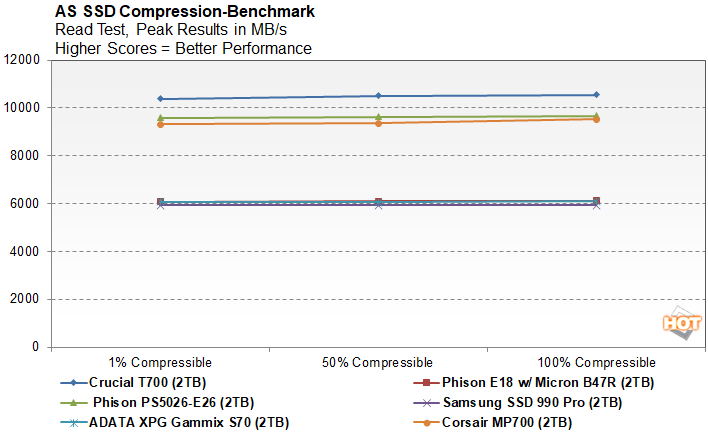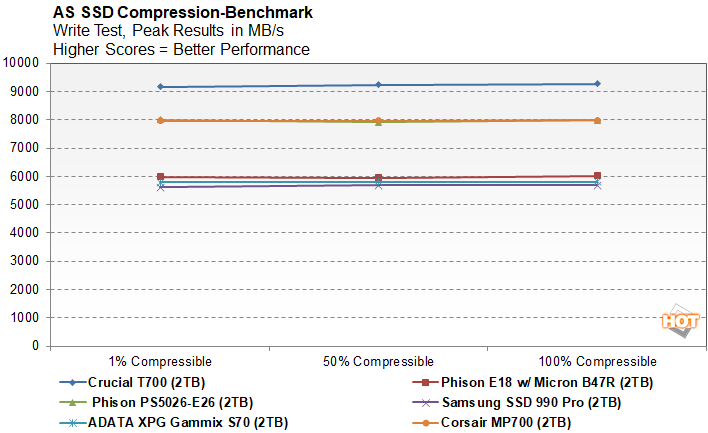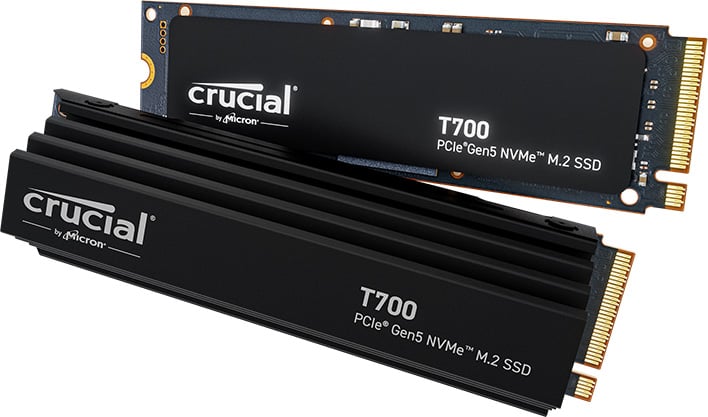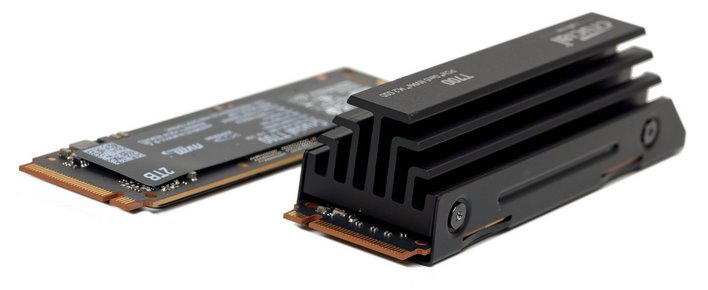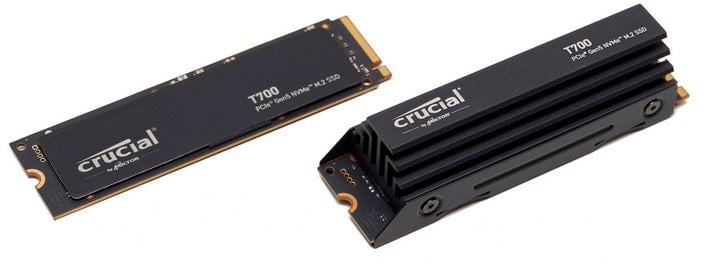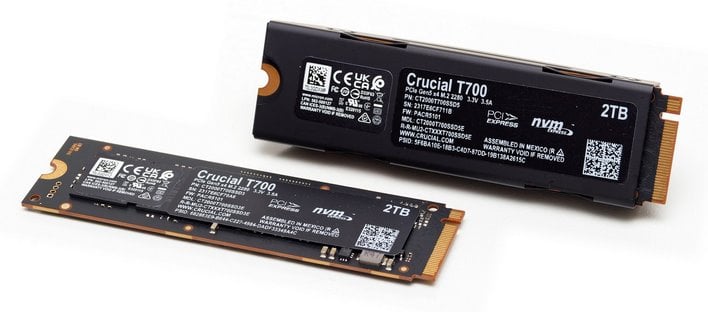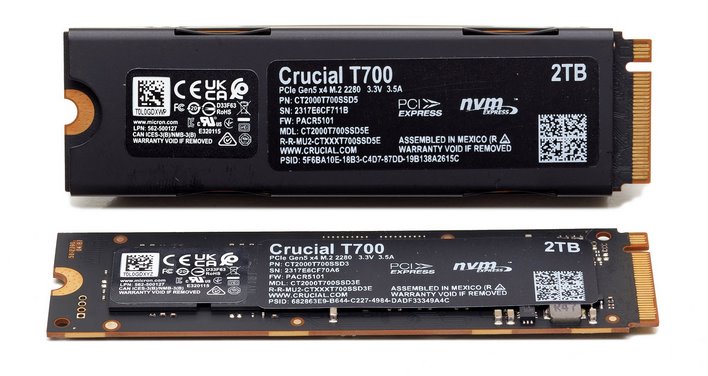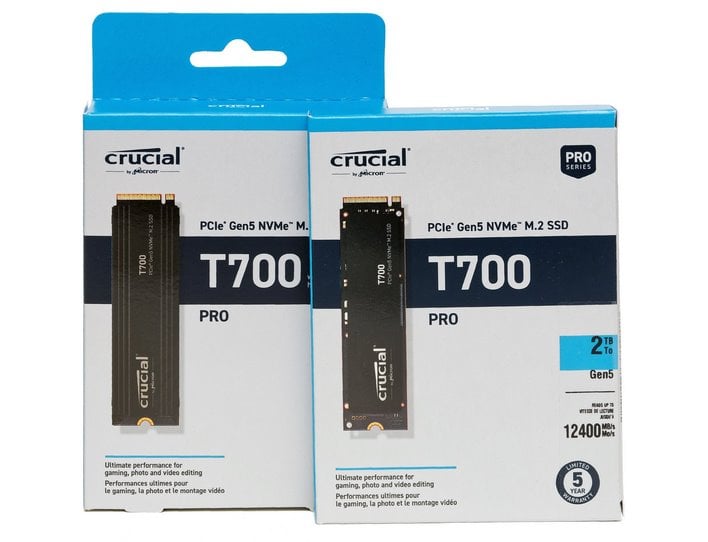Crucial T700 Review: The Fastest PCIe 5 SSD For Enthusiasts
Crucial T700 Review: Blazing Fast, PCIe Gen 5 Storage For Desktops
| Crucial T700: Starting At $209 (1TB), $369 (2TB w/ Heatsink) The PCIe 5 Crucial T700 enthusiast-class SSD pairs Micron 232-layer 3D NAND flash to the Phison E26 controller with fantastic results.
|
|||

|

|
||
After showing them off over the last few months, Micron is officially launching its Crucial T700 series of PCIe Gen 5.0 NVMe solid state drives today, and we’ve got a couple of retail-ready samples to show you in all their glory. As most of you probably know, the first wave of high-performance PCIe 5.0 SSDs begun to hit the market over the last few months, with virtually all of them leveraging Phison’s E26 controller and 1600MT/s flash memory. As such, due to their underlying similarity, most of the drives perform comparably and are in-line with Phison’s own reference platform, which we previewed here.
The Crucial T700 is a bit different, though. Micron has outfitted this drive with its own, bleeding-edge 2000MT/s 232-layer 3D TLC NAND, which gives the T700 a potential edge over everything else currently available. The Phison E26 is actually capable of using up to 2400MT/s NAND, but that’s not quite ready for prime time and is a discussion for another day. Today we’re going to check out the Crucial T700 and see if its superior specs make it the current enthusiast-class SSD to beat...
Crucial T700 Specifications And Features
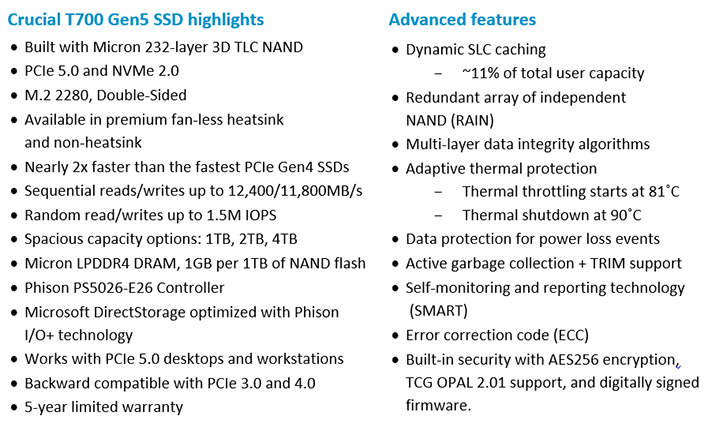
Find The Crucial T700 PCIe 5 SSD @ Amazon
We should also point out, however, that some sort of cooling is absolutely required for these drives. The non-heatsink model will operate without added cooling, but under sustained loads, it will heat up quickly and throw errors.
Other than the cooling considerations, the Crucial T700 looks just the vast majority of high-end M.2 drives currently on the market. The drives use the common M.2 2280 form factor and feature dark-colored PCBs with both sides of the board populated with an array of components (at least on the 2TB model we evaluated).
Both sides of the PCB are covered, however, either by a stylized graphene/aluminum heat spreader (top) or by large decal (bottom) adorned with all of the drive’s pertinent data and branding.
As mentioned in the introduction, the foundation of the Crucial T700 is an 8-channel Phison PS5026-E26 controller, which is paired to some of Micron’s own 232-Layer 3D TLC NAND Flash memory operating at 2000MT/s, in addition to few pieces of LPDDR4 DRAM cache (1GB per 1TB of capacity), and customized Micron/Crucial firmware.
Other features of the Crucial T700 drives include a PCIe Gen x4 (Gen 5) interface, support for the NVMe 2.0 specification, and built-in AES256 encryption with TCG Opal 2.01 support.
Performance of the Crucial T700 will vary somewhat depending on the capacity of the drive being tested. We are looking at a 2TB drive here, which Crucial rates for up to 12,400 / 11,800MB per second reads and writes, respectively, with up to 1.5M read and write IOPS. Endurance for the 2TB drive we have here is rated for 1200TBW (1.2PBW), though that number scales upward or downward depending on the total capacity. Micron also backs the drives with a full, five year warranty.
The specs for the Crucial T700 look stellar, but that doesn’t mean much if its actual performance doesn’t match-up, so let’s get to some testing...
Crucial T700 SSD Benchmarks
Under each test condition, the SSDs showcased here were installed as secondary volumes in our testbed, with a separate drive used for the OS and benchmark installations. Our testbed's motherboard was updated with the latest BIOS available at the time of publication and Windows 11 was fully updated. Windows firewall, automatic updates, and screen savers were all disabled before testing and Focus Assist was enabled to prevent any interruptions.
In all test runs, we rebooted the system, ensured all temp and prefetch data was purged, and waited several minutes for drive activity to settle and for the system to reach an idle state before invoking a test. All of the drives here have also been updated to their latest firmware as of press time. Where applicable, we would also typically use any proprietary NVMe drivers available from a given manufacturer. When not available, the drives used the Microsoft driver included with Windows 11.HotHardware's Test System:
| Processor: Intel Core i9-13900K Motherboard: MSI Z790 Godlike Video Card: GeForce RTX 3080 Memory: 32GB Micron DDR5-6000 Storage: ADATA XPG GAMMIX S70 Blade (OS Drive) ADATA XPG GAMMIX S70 (2TB) Phison E18 B47R (2TB) Phison E26 (Reference) (2TB) Samsung SSD 990 Pro (2TB) Corsair MP700 (2TB) Crucial T700 (2TB) |
OS: Windows 11 Pro x64 Chipset Drivers: Intel v10.1.19284 Benchmarks: IOMeter 1.1 HD Tune v5.75 ATTO v4.01.01f AS SSD SiSoftware SANDRA CrystalDiskMark v8.0.4c x64 Final Fantasy XIV: Endwalker PCMark 10 Storage Bench 3DMark Storage Tests |
IOMeter Benchmarks
IOMeter is a well-respected industry standard benchmark. However, despite our results with IOMeter scaling as expected, it is debatable as to whether or not certain access patterns actually provide a valid example of real-world performance. The access patterns we tested may not reflect your particular workloads, for example. That said, we do think IOMeter is a reliable gauge for relative throughput, latency, and bandwidth with a given storage solution. In addition, there are certain highly-strenuous workloads you can place on a drive with IOMeter, that you can't with most other storage benchmark tools.In the following tables, we're showing two sets of access patterns; a custom Workstation pattern, with an 8K transfer size, consisting of 80% reads (20% writes) and 80% random (20% sequential) access and a 4K access pattern with a 4K transfer size, comprised of 67% reads (33% writes) and 100% random access. Queue depths from 1 to 16 were tested...
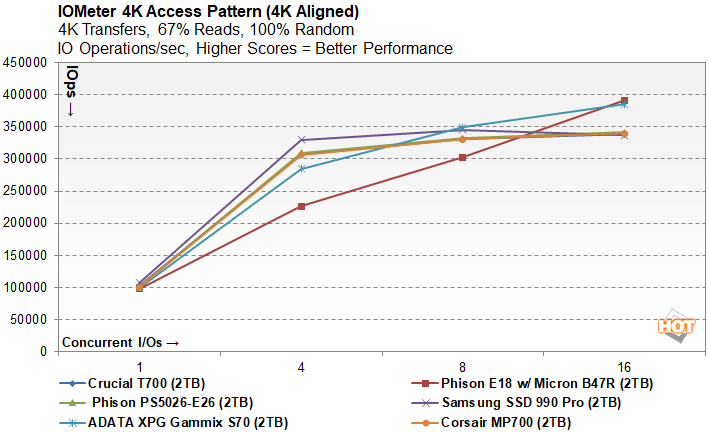
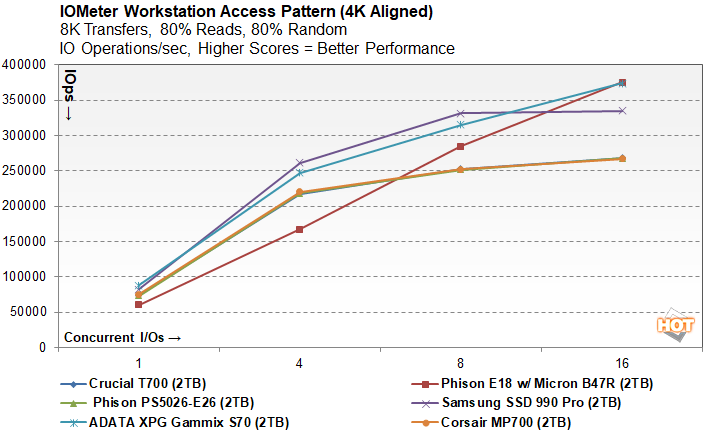
You may be wondering where the Crucial T700's results are in the two tests above -- well, they're right in-line with the Phison reference platform and Corsair MP700. At the lower queue depths, with both access patterns, the Crucial T700 finishes about in the middle of the pack, but all of these drives perform strongly here.
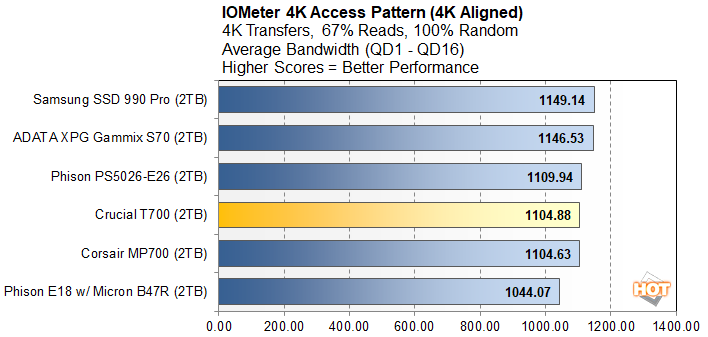
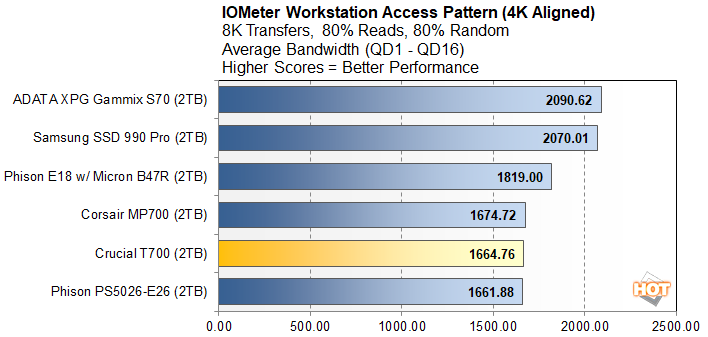
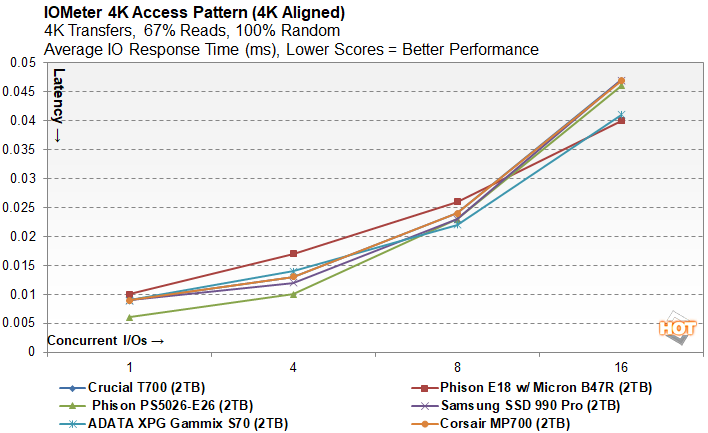
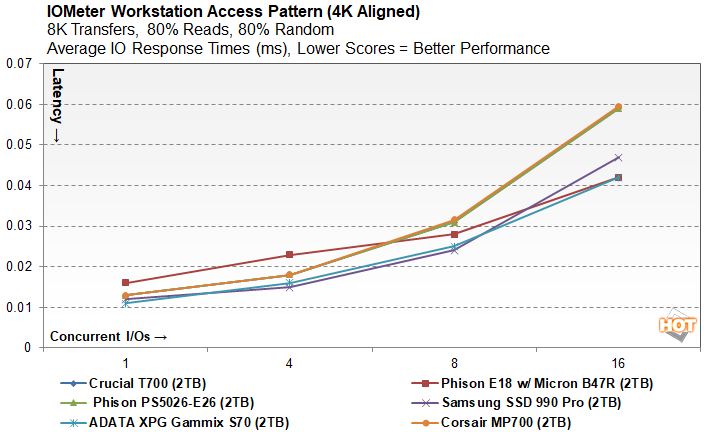
In terms of latency, the Crucial T700 once again performs right in-line with Phison E26 reference platform, which is to say it offers some of the best latency characteristics at the lower queue depths (which are most important for the overwhelming majority of consumer workloads), but the scales tip in favor of the other drives at the highest queue depths.
SiSoft SANDRA 2022
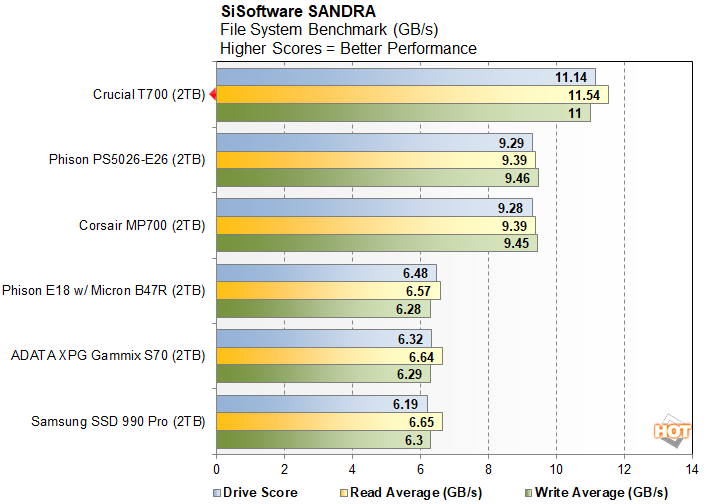
The Crucial T700 performed exceptionally well in SANDRA's File System bandwidth benchmark. Here the drive clearly leads the pack with the best average read and write performance by far.
ATTO Disk Benchmark
ATTO is another "quick and dirty" type of disk benchmark that measures transfer speeds across a specific volume length. It measures raw transfer rates for both reads and writes and graphs them out in an easily interpreted chart. We chose .5KB through 64MB transfer sizes and a queue depth of 6 over a total max volume length of 256MB. ATTO's workloads are sequential in nature and measure raw bandwidth, rather than I/O response time, access latency, etc.
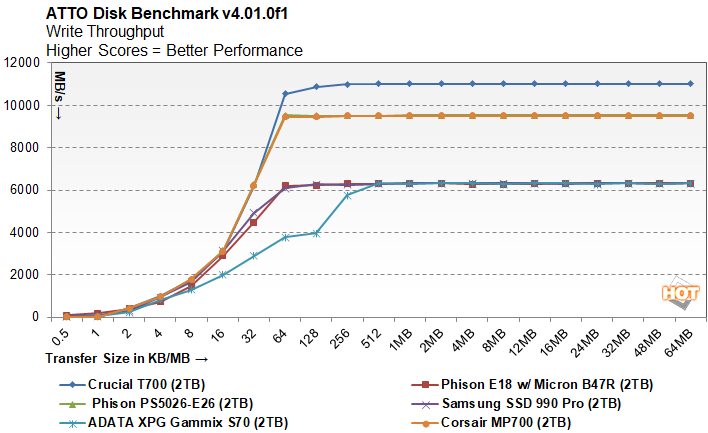
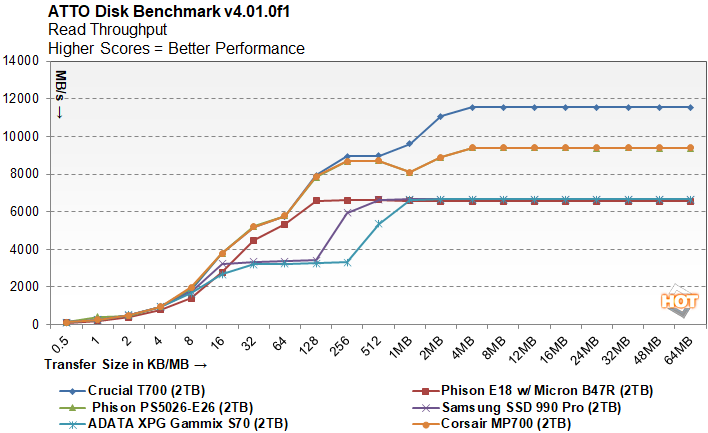
At the smallest transfer sizes, all of these high-end SSDs perform similarly, but once it hits about the 32K - 128K mark, the Crucial T700 pulls away from the pack and offers the best read and write throughput we've seen from any SSD to date.
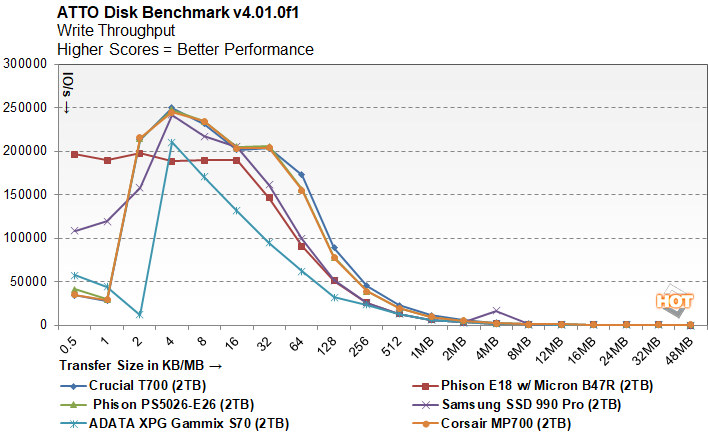
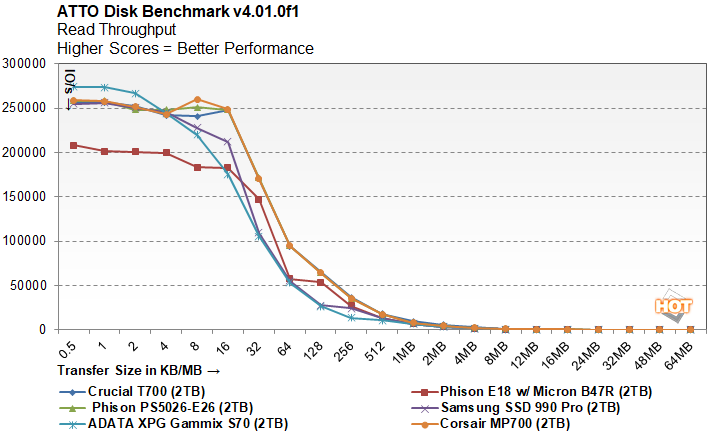
Once again, we see the Crucial, Corsair, and Phison E26 reference drive perform similarly, which is to be expected here. They're typically strongest from about the 32K - 512KB mark, with the Crucial drive leading by a small margin overall.
AS SSD Compression Benchmark
Next up we ran the Compression Benchmark built-into AS SSD, an SSD specific benchmark being developed by Alex Intelligent Software. This test is interesting because it uses a mix of compressible and non-compressible data and outputs both Read and Write throughput of the drive. We only graphed a small fraction of the data (1% compressible, 50% compressible, and 100% compressible), but the trend is representative of the benchmark’s complete results.
